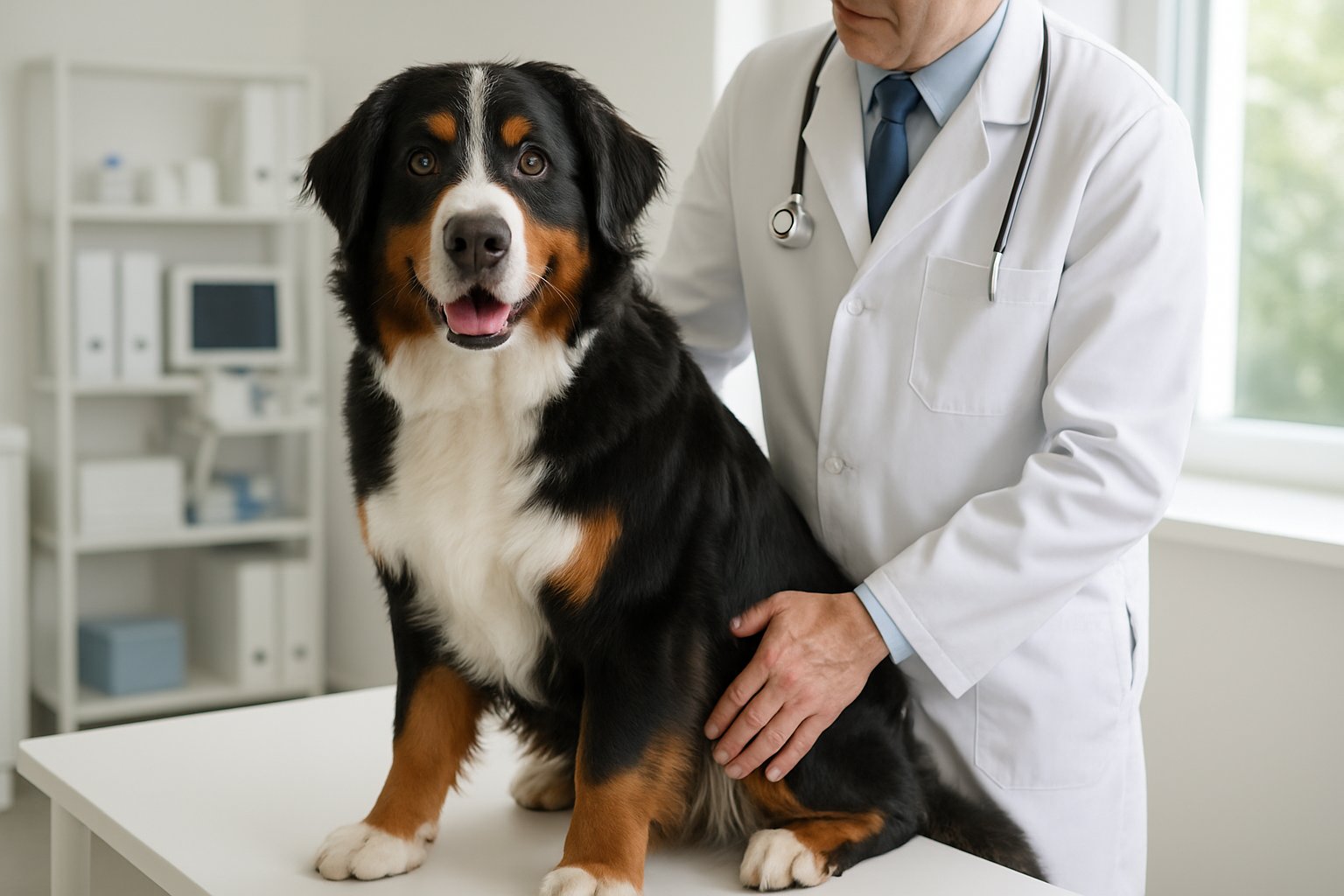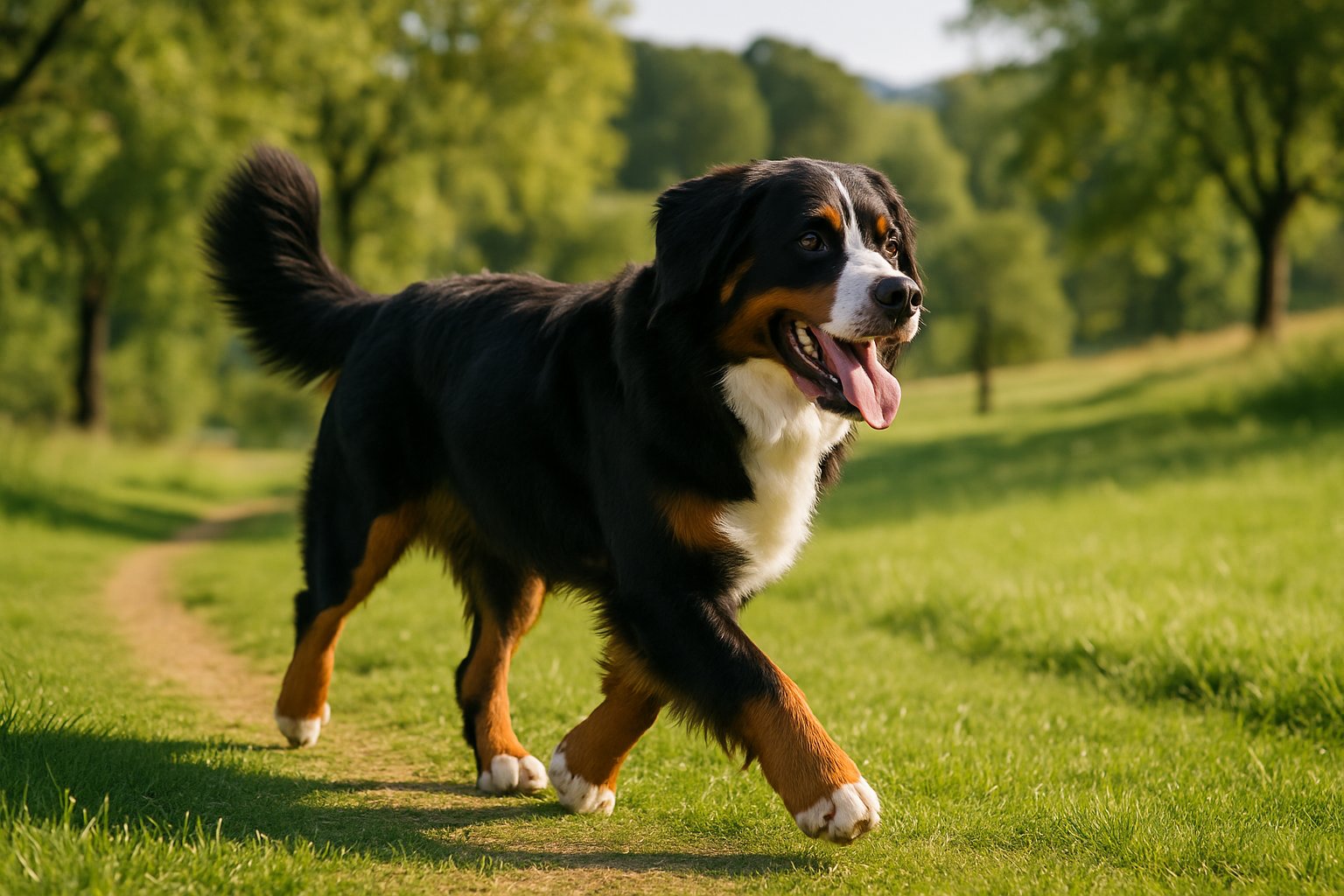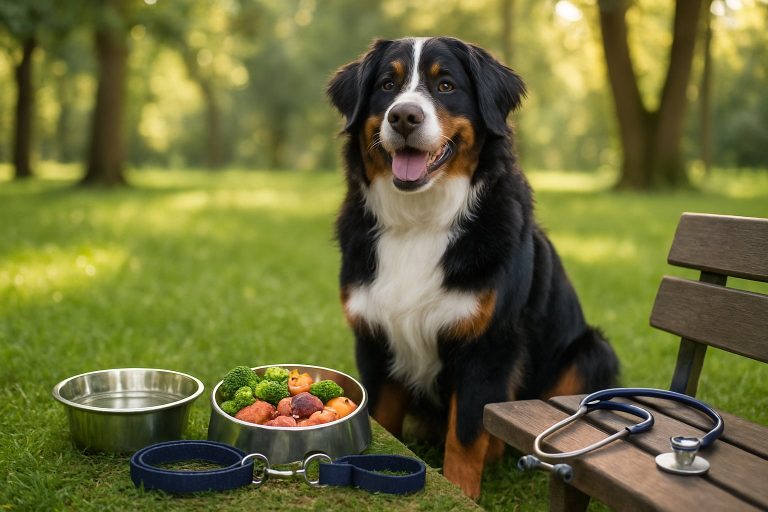Caring for your Bernese Mountain Dog means understanding their unique health needs and daily requirements. Giving proper attention to their well-being helps them live a happier and more comfortable life.
You’ll find that even small actions can make a big difference for your dog. Learning these key health tips is an important step for anyone who wants the best for their Bernese Mountain Dog.
1. Regular hip dysplasia screenings
- Hip dysplasia is a common problem in Bernese Mountain Dogs. This condition affects the hip joint and can cause pain and trouble walking. Regular screenings help you catch signs early.
- A veterinarian can check for hip dysplasia by examining your dog and taking x-rays. Early detection makes it easier to manage symptoms and plan treatment if needed.
- Screenings are important, especially because Bernese Mountain Dogs are more likely to develop hip problems due to their large size and genetics. Puppies and young adults benefit from early checks as they grow.
- Ask your vet how often your Bernese Mountain Dog should be screened for hip dysplasia. Regular checks give your dog the best chance for a healthier, more comfortable life. Learn more about hip dysplasia in Bernese Mountain Dogs and prevention steps from this detailed guide.

2. Balanced diet rich in omega-3 fatty acids
- Giving your Bernese Mountain Dog a balanced diet with omega-3 fatty acids is important for their health. Omega-3s help support their heart, skin, and coat.
- Omega-3 fatty acids also play a role in reducing inflammation. This can be especially helpful for large breed dogs like Bernese Mountain Dogs who may face joint pain as they get older.
- Key sources of omega-3s include fish oil, salmon, mackerel, flaxseed, and chia seeds. Regularly adding these foods to your dog’s diet can help support their overall wellness. For more information on good omega-3 sources, check out this list of omega-3-rich foods.
- When choosing dog food or supplements, look for those that list omega-3 fatty acids or fish oils in the ingredients. Making these choices gives your dog important nutrients that can keep them healthier as they age.
3. Daily moderate exercise to maintain joint health
- Bernese Mountain Dogs need moderate daily exercise to keep their joints and bodies healthy. Too little movement can cause stiffness, while too much can lead to joint strain. Aim for around 30 to 60 minutes of daily activity.
- You can keep your Bernese Mountain Dog active with walks, gentle hikes, or play sessions in the yard. Choose exercises that are easy on the joints and avoid high-impact jumping or rough play, especially as they age.
- Making time for both physical activity and mental stimulation is important. Training games and obedience sessions can help challenge their mind and add variety to their routine. For more ideas on safe activities, check out this guide on Bernese Mountain Dog exercise needs.
- Regular, moderate exercise helps keep your dog’s joints healthy by improving flexibility and promoting strong muscles. This also helps reduce the risk of obesity, which puts extra stress on the joints. Learn more about the best exercise strategies for Bernese Mountain Dogs.
4. Routine grooming to prevent matting and skin issues
- Regular grooming is important for Bernese Mountain Dogs. Their thick double coat collects dirt and can develop mats if not cared for. Mats and tangles are not just messy—they can trap moisture and cause skin irritation.
- Brush your Bernese at least a few times a week. This helps remove loose fur and stops tangles before they turn into mats. Using the right grooming tools makes a big difference in keeping their coat healthy and comfortable.
- Bathing should be done every few months or when your dog gets dirty. Do not bathe too often, as this can dry out their skin. Always dry the coat fully to avoid dampness, which can lead to skin problems.
- Pay close attention to the skin as you groom. Look for any redness, bumps, or signs of infection. Early grooming helps you catch issues before they become serious. You can find more tips for maintaining a healthy coat on a Bernese Mountain Dog.
- Regular ear checks are also important. Clean them gently to prevent wax buildup and infections, which are common in dogs with floppy ears. Keeping nails trimmed will help your Bernese move comfortably and avoid painful cracks or breaks.
5. Annual vet check-ups for early disease detection
- Taking your Bernese Mountain Dog for yearly check-ups helps catch health issues early. Regular vet visits allow your veterinarian to spot the first signs of sickness, even when your dog seems healthy.
- Early detection is important for this breed. Bernese Mountain Dogs can be prone to cancer, hip and elbow problems, and heart issues. An annual exam helps screen for these problems sooner.
- Your vet may suggest bloodwork, checking teeth, and feeling your dog’s joints. Each visit is a chance to talk about vaccines and preventatives, which help protect your dog in the long run.
- By making these check-ups a routine, you support your dog’s long-term well-being and improve their quality of life. Regular exams give you peace of mind and more options for treatment if a problem appears.
6. Vaccinations and parasite prevention
- Keeping your Bernese Mountain Dog up to date with vaccinations is important for their health. Core vaccines protect against serious diseases like distemper, parvovirus, and rabies. Your vet will provide a schedule based on your dog’s age and health.
- Non-core vaccines might also be recommended. These protect against diseases like Bordetella and Lyme, depending on where you live and your dog’s lifestyle. Ask your vet which vaccines are necessary for your pet.
- Preventing parasites is another step you should not skip. Fleas, ticks, and worms can make your dog sick. Regular treatments can help keep these pests away and protect your dog from diseases.
- Check your dog for signs of fleas or ticks, especially after walks. Parasite prevention medicine is usually given monthly or as recommended by your vet. Your veterinarian can suggest the best plan for your Bernese Mountain Dog’s needs.
7. Dental care including regular teeth brushing
- Taking care of your Bernese Mountain Dog’s teeth is important for their health. Dental problems can lead to pain, trouble eating, and even heart or kidney issues.
- Brush your dog’s teeth regularly with a soft-bristled toothbrush made for dogs. Toothpaste made for humans is not safe for dogs. Try to brush their teeth at least two to three times per week, but daily brushing is best.
- You can also use dental chews or toys designed to help keep their teeth cleaner. These help reduce buildup on their teeth, but they do not replace brushing.
- Professional dental cleanings by your vet are sometimes needed. Your vet will let you know if your dog needs this type of cleaning.

8. Weight management to reduce stress on joints
- Bernese Mountain Dogs are prone to joint problems because of their large size. Carrying extra weight puts more pressure on their hips and knees. This can make arthritis and other joint issues worse as your dog gets older.
- Helping your dog maintain a healthy weight is important for joint health. Feed your Bernese Mountain Dog the right amount of food for their age and activity level. You can use a Bernese Mountain Dog feeding chart to guide portion sizes.
- Regular exercise also helps manage weight and supports strong muscles. Go for daily walks and play gentle games that don’t put too much stress on their joints. Always avoid overfeeding, even with treats.
- Keeping your dog at a healthy weight can reduce their risk of joint problems and other health issues. Bernese Mountain Dogs who are not overweight are less likely to have hip and elbow pain as they grow older. A healthy weight also supports their heart and helps them stay active longer.


